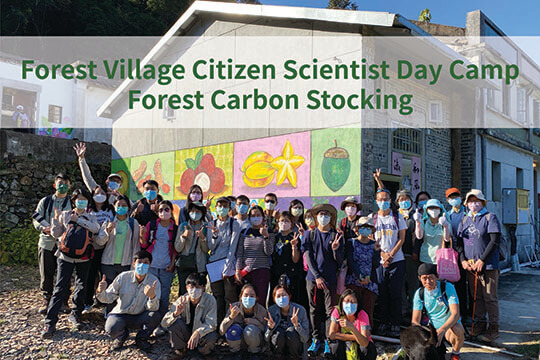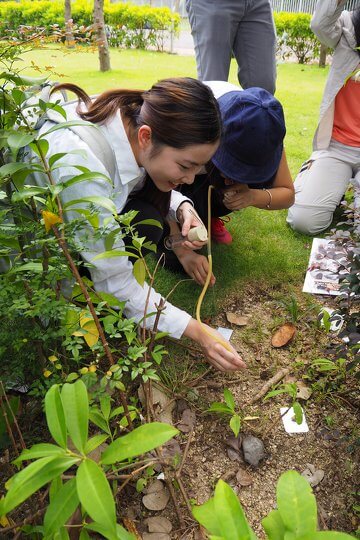Place-based Education

City Nature Challenge
The City Nature Challenge (CNC) is a large citizen science event covering cities around the globe. It was first held in 2016 by the California Academy of Sciences and Natural History Museum of Los Angeles County. This is a competition that brings cities from around the world together. Citizens of participating cities record local wildlife with the free app iNaturalist. After species identification, the city that records the greatest number of species will win the competition. Data collected during the competition would contribute to the global biodiversity database and assist scientists in ecological research.
Since 2023, OWLHK has been the volunteer city organizer for the City Nature Challenge (Hong Kong Region), helping to promote the City Nature Challenge in Hong Kong. During the period of 24-27 April 2026, the public could take photos of wild animals and plants in Hong Kong. Then, in the period of 28 April-10 May, participants could upload records and identify species. Eventually, the competition result will be announced on 13 May.

LCF Lantau Wetland Ecological Education and Outreach Program
The Lantau Island has rich wetland environments, harbouring numerous organisms, including diverse and unique communities of aquatic insects like water beetles, playing important roles in sustaining wetland ecosystem services. These precious natural resources deserve more attention and appreciation from the public with prioritized conservation management. Nevertheless, knowledge and awareness of wetland and insect ecology are lacking in general. Hence, this project takes a step forward in enhancing Lantau’s wetland environmental education and conservation with aquatic beetle ecology and artistic elements as the breakthrough points.
The project is divided into two parts. First, it fosters the general public to learn and appreciate Lantau’s wetland environments and wildlife (particularly aquatic insects) via various art activities, including underwater photography and art creation workshops. Second, it consists of Wetland Ecology Tutor Training for Tertiary Students and subsequent citizen science activities. These provide opportunities for the general public to have in-depth understanding about Lantau’s wetland ecology and contribute to the conservation by participating in wetland beetle surveys.

LCF Lantau Countryside Ecological and Cultural Education Programme
You would be amazed by Lantau’s nature, as well as its unique culture. Through this project, general public and Lantau stakeholders were able to join together to explore Lantau even more, in a fun and brand-new way.
An APP called Echo Tour was made to guide users exploring different hiking trails in Lantau through outdoor audio guide. You could listen to the stories told by local Lantau residents themselves and get to learn about the local ecology from experts from different aspects. Meanwhile, Lantau residents and tertiary students were trained as ambassadors to guide field trips in Lantau butterfly and bird hotspots. Ambassadors could contribute directly to Lantau conservation by raising the conservation consciousness of other people while they enjoyed the amazing biodiversity of Lantau.

Forest Village Citizen Scientist Day Camp -
Forest Carbon Stocking
OWLHK held 【Forest Village Citizen Science Camp – Forest Carbon Stock】. Through lectures, workshops and group discussions, participants learnt and practised forest surveying methods, such as tree measurement, undergrowth vegetation coverage estimation, and forest carbon stock calculation. Results gathered and analysed in the camp were utilized by biodiversity monitoring project of the programme.

Impression of Natural Lantau Video Competition, ECF Exploring WILD Lantau
For the sake of demonstrating the unique wildlife in Lantau, we encouraged the public to capture the ecological scene via video production in this competition. Throughout the programme, we organized experience sharing sessions and workshops with the experts of wildlife photographers. Thus, public participation and acknowledged the background of Lantau wildlife as well as the technique of wildlife videography.
Search in Lantau, ECF Discovering South Lantau Invertebrates
South Lantau nurtures amazing biodiversity, but it is mostly undiscovered by the society. By organizing the training camp and the wildlife search, the public participant observed and familiarized the insects and invertebrates in daily life. Hence, the member became acquainted with the Lantau environment and worked on the conservation together.
Training Programme of Tree Docent in Tuen Mun Society
Collaborating with a Tuen Mun local community - Findingroots, this programme comprised of theoretical and applied lectures. It introduces the common plants in the urban, and further instruct the ecology of tree in the society as well as the management mode.

Orienteering Activity in Tai Po
Tai Po District consists of urban and countryside. Traditional village and natural environment preserve in this area. By the orienteering activity, participants visited Lam Tsuen River and urban parks to become acquainted with ecology and wildlife downtown. Moreover, they surveyed the forest-friendly product in the community, as well as investigated the issue of river channel development, town planning and tree preservation.

Day and Night in Lantau
Known as the backyard of Hong Kong, Lantau Island was the region that this programme explored. It had two types of field trip: In the daytime, we strolled through the coastal walkway to observe the species diversity of butterfly and plant, as well as the relationship between them. After the nightfall, we led a night safari to explore the major wetland of South Lantau Pui O. Seeking the amphibians and reptiles in the wild, this programme pursued the public to be inspired and acknowledge the vividity of nature in Lantau.

“Ecology and Biodiversity in Lantau” Series
Participating in the Hong Kong Biodiversity Festival 2017 organized by Agriculture, Fisheries and Conservation Department (AFCD), this programme chiefly introduced ecology of plants. We guided the public to explore Lantau in 3 aspects: wildlife, humanity, and history. We familiarized the participants with the relationship between butterfly and plant on a coastal pathway in Tung Chung. Next, we walked through Shui Hau, introduced the wisdom from traditional villagers, who made use of natural resources in daily life. Also, we observed the species diversity of plant in the ancient country trail at Ngong Ping.




